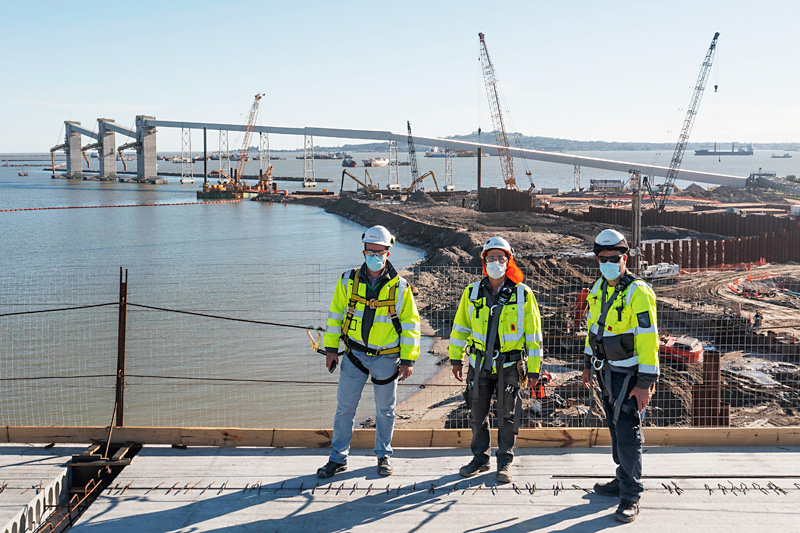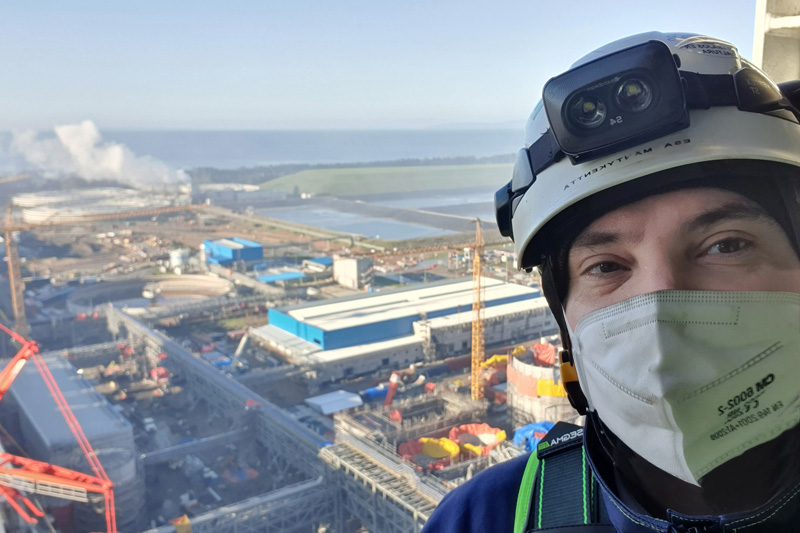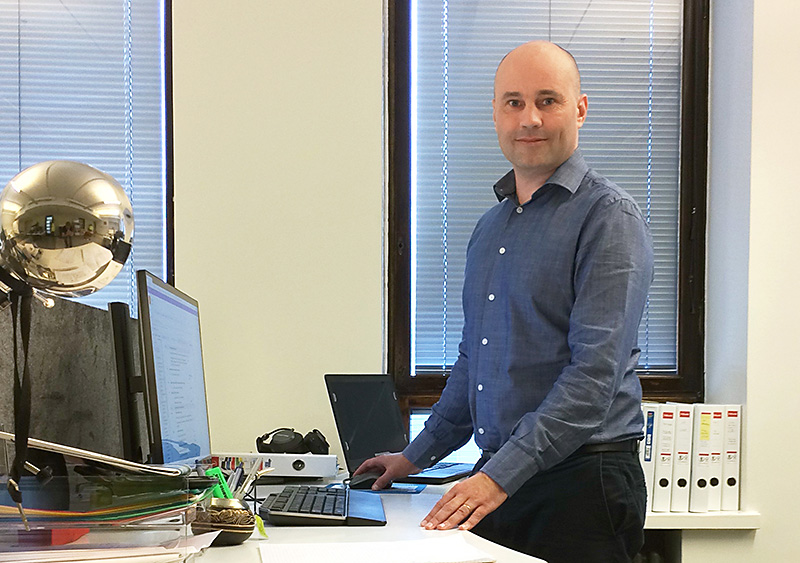International Fimpec, part 1: Site supervisor Juan Artucio, Uruguay

In this article series we get to know Fimpec’s international experts. In this first part, Uruguayan site supervisor Juan Artucio talks about his work philosophy and experiences working for Fimpec at the port terminal project in Montevideo.
Juan Artucio (center) in the port of Montevideo, together with Santiago Zamora of Fimpec (right) and Marcelo Alvarez of UPM (left). They are working on the same port terminal project.
Juan Artucio works in the port terminal project in Montevideo, Uruguay, where Fimpec is in charge of site management. It is one of Fimpec’s most significant international projects. Juan has almost ten years of experience working in site supervision tasks on various projects in Uruguay. He has studied civil engineering and business administration.
Juan’s work as site supervisor includes coordination, ensuring quality and schedules, seeing plans through and solving problems. For almost his whole career, Juan has worked with renowned Uruguayan engineer Jorge Kliche, from whom Juan says he has learned a lot:
“Jorge has a lot of knowledge and experience of the construction industry in Uruguay. He is a competent leader and a good mentor. It was through him that I came to work for Fimpec and the port terminal project.”
“An international experience in my home country”
Juan explains that he had waited a few years for the opportunity to work in the port terminal project. His mentor Jorge has worked with UPM for a long time, and in 2017, UPM announced that they would start investigating the possibility of building a pulp mill in Uruguay. In 2019, UPM confirmed their plans to build the pulp mill, and in the same year, construction of the port terminal, which is part of UPM’s large-scale investment in Uruguay, began.
The port terminal project in Montevideo, Uruguay, is a multinational site with experts from Finland, Uruguay and the UK, and contractors from all over the world. For Juan, this is only a good thing.
“There are different nationalities among our project team and contractors, and I think that we have a lot to learn from each other. I have noticed, for example, that the Finns are better at separating work and spare time. I would like to be better at this myself, because I often bring work home and talk about work matters with my girlfriend, who also works in the project.
“However, a multinational environment calls for openness, patience and empathy from all of us. I have often described this project as an international experience in my home country,” Juan explains.
A clear work philosophy as a guideline
Juan’s personal way of working is based on a sort of motto that originates from his experience with Fimpec and his previous jobs.
“I try to be tough and fair. This is something I have discussed on many occasions with my boss at Fimpec. In my work I often talk with contractors about what we need and when we need it, and this can be challenging at times. There are a lot of people at the site, and we have to make everything smooth for everyone. This is when the ‘tough and fair’ philosophy comes into play. We do have a very cooperative atmosphere at the site between all parties,” says Juan, describing his work philosophy.
For Juan, the tough and fair philosophy also encompasses empathy and transparency. Without them it is hard to get people to believe, trust and follow you.
“One Uruguayan football director once said that trust goes up on the stairs and comes down in an elevator. For me, this is an important saying and almost a way of life. Empathy, the ability to put myself in someone else’s shoes, is very important both professionally and personally,” Juan stresses.
Being tough and fair is not always easy, but according to Juan, it is necessary and even ethical. In the end, it is about doing what is best for the overall success of the project.
“I always try to convey to the contractors that we are working for the success of the project, because that is our ultimate goal. Being tough requires some intricacy, because it is not about bullying, but about being tough in a friendly manner. It is about making people understand why something needs to be done, and if you are able to do that, it serves the success of the project,” he says.
Internationality and development attract
Although Juan says his work keeps him quite busy, he also has time for other things. In his spare time, he enjoys gardening at his new house and spending time with friends while barbecuing on a traditional Uruguayan parrilla.
“I recently moved to a new neighbourhood, which I like very much because it’s quiet. A few years ago I didn’t think that I would live in the suburbs, but that’s how life goes. In my spare time I have been working on my new house and now that it is finished, I like to tend to the garden. There’s also a Uruguayan parrilla at my house, so I often invite friends to barbecue and hang out,” says Juan.
As for work, Juan is hopeful about his future prospects at Fimpec, because Fimpec’s way of operating, which enables professional growth, has left a good impression. According to Juan, professional development is encouraged and there are possibilities for it. He would also like to increase his international experience abroad.
“For me, it is an honour to work in this project and for Fimpec. This is a great opportunity for my career and for me personally. My boss is a good leader, and I can learn a lot from him. Working with him and the other experts in this project is great, and once this project is finished, I would gladly continue working at Fimpec possibly in a project abroad, so that I can gain more international experience,” Juan concludes.


